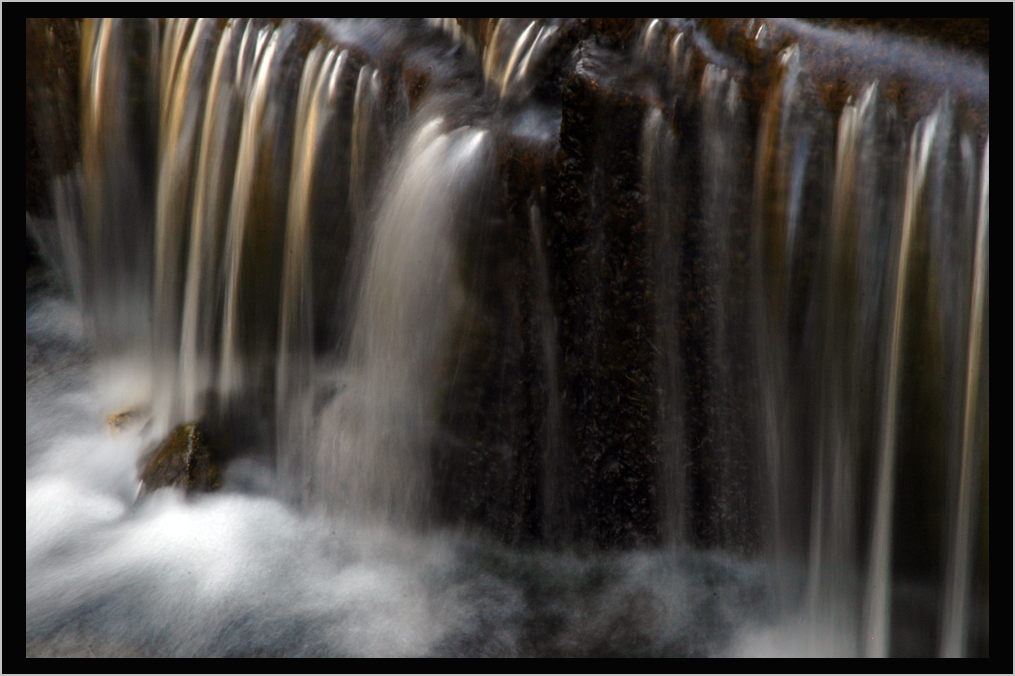

Dipper Falls, whisper veil, Cliff River . . . Eagle Cap Wilderness
On the road in the American Northwest. [ click photo for next . . . ]


Dipper Falls, whisper veil, Cliff River . . . Eagle Cap Wilderness
On the road in the American Northwest. [ click photo for next . . . ]
Epihany is one of those beautiful words that comes to us from the ancient
Greek. It means to reveal, in the sense of sudden insight or inspiration.
In a way, insight, which for me is an actual movement of energy, or
intelligence, is everything. Insight is not for me something personal,
but rather moves, or is in resonance with, the individual. Insight is what
I look for in works of Art. I find it, for example, in Bach's Goldberg
Variations, as well as in Glenn Gould's performance of these. I find it
in certain seminal addresses of Dr. Martin Luther King, Jr. Or in the ideas
and style of thinking of a Buckminster R. Fuller. Or the brilliance of
Benoit Mandelbrot's fractal geometry. And, of course, I find it
everywhere in Nature, especially in natural form.
It seems to me that present-day Western culture has turned its back
on this energy of insight, and already two or three generations
ago has filled the empty space with mere entertainment. That is why wildness
is, and has always been, so important. Because it turns off the entertainment,
and turns off this incessant chatter of voices telling us what to believe,
and what to think.
Three legendary moments of insight every child might well learn by heart,
and which are especially dear to me, are brought together here in a little
set of three 37-step poems which dances around this theme. The Greek
philosopher, Pythagoras, who explored the world of sound and
used it as his model of creation, is seen at the moment he hears a musical
octave ringing out on the heavy anvils of a blacksmith's shop and goes
on to figure out why. The teacher / student duo—one of the greatest
of all time—of Anne Sulivan and Helen Keller is here at the moment
Helen—both deaf and blind—suddenly sees that everything in the
world has a name. This is a moment which seems to manifest
the very essence of what learning and insight are, and, like a lightning bolt
out of nowhere, shatters current mechanistic theories of the mind. And
lastly, there's our humble earth-bound reptile as it for the very first time
takes to the air on newly discovered wings. I've always felt that this
hypothetical moment is directly linked to humankind's great leap
to the Moon and back.
In order for a variation form like this to really flower, one needs to do
them in sets or sequences. Try reading them out-loud to get a sense of
how the rhythms and accents change in surprising ways while still
keeping to their basic 37-step pattern:
Epiphanies
(I)
Lover of wisdom,
Pythagoras hears two anvils
sound octaves at a blacksmith's shop.
Suddenly,
half of weight is half
the length of a string lightly touched.
(II)
"Wa-ter. Wa-ter. Wa-
ter." Thrice the fingers of the teacher
write in the palm of a girl's hand.
Suddenly,
all things have names, and
the girl sees more than those who see.
(III)
Strangest of creations,
a serpent with arms and feathers
slithers to the edge of its cliff.
Suddenly,
take-off, thin air! O
tracks left in the dust of the moon.
Thompson Meadow,
Eagle Cap Wilderness,
Oregon, X.23.2008
Featured gallery, mountain water . . . .Please visit my MOUNTAIN WATER Gallery—some of
the best of my flowform photography w/ a selection of the highest quality
prints & frames . . . [ mouse over for controls / lower right fro full-screen ]
All Photographs & texts by Cliff Crego © 2011 picture-poems.com
(created: III.3.2008)